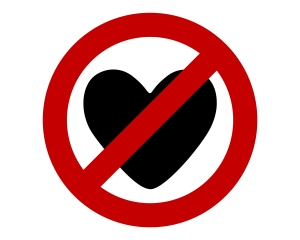
Rules Don’t Rule the Heart
Sure sure I’ve heard it before RULES! RULES! RULES! THEY TOTALLY RULE! Except sometimes they sort of don’t. Rules are not a panacea ( panacea – n. A solution or remedy for all difficulties or diseases).
They can be helpful in some situations, but very often they can actually impede the very thing that can create change in your life, AWARENESS!!! (oooo ahhh).
I love rules and who doesn’t, they make life so simple. I just listen to this set of parameters my mind determines and everything will be fine. I mean that’s what makes human beings so great, it’s our ability to blindly follow a set of instructions without question.
Ok ok so you have you have probably picked up on my sarcasm at this point, but maybe not. I don’t really think that following rules are what makes us unique animals.
Bee’s and Ants are great because they follow set rules well and in some ways humans ability to follow rules has helped us, but what really make us unique is our ability to adapt and reflect.
Humans are unique in our ability to problem solve, but even more so we are unique in our ability to be aware of our awareness. We can reflect on whether or not we are being present in a situation and what our motivations are.
The key to adapting successfully is awareness, but all to often we rely on rules instead of awareness to guide us. So let take the same situation and see what happens when we use rules instead of awareness to guide us.
Sally has lost alot of weight in the past, but has put some of it back on. She works out regularly, but feels like she has lost her way out of fitness. She notices she has some cheese in her fridge. She knows that if she has cheese, she will eat it, so she throws it out. She decides no more cheese, but then another voice arises in her, perhaps one of not wasting food or maybe a voice that is comforted by cheese when she feels anxiety.
She reconsiders takes the cheese out of the garbage, but then the rule voice reemerges, “NO CHEESE!” it says. So back in the trash with cheese. She feels better, but is not quite sure what happened. She wishes she could be stronger, that she was just a normal person.
In this example, we can see all the forces at play for Sally, but she doesn’t necessarily notice them. She is aware of only one kind of hunger: “Mind Hunger.”
Mind hunger is hunger based on rules and regulations set up by our mind. All the facts and figures that you have in your head about how you eat, all the ideas you have about nutrition, and all the articles you have ever read about food are what make up mind hunger.
The problem with mind hunger and the rules that it makes up, is that they can either be followed or broken. It’s a very black and white world, but this world only works we are feeling good and strong.
In the example above, there are all these other hungers and voices that Sally may not see. There is heart hunger, her need to be comforted. There is mouth hunger, her love of the taste of things like cheese. There is also likely some inner critic, Sally’s internal voice that tells her she will fail. There is an inner coach that is telling her how to get in shape. All of these factors are hidden behind a wall of rules and morality.
Now let’s imagine what might happen if Sally was aware of all of her hungers and the voices that created this internal struggle over weight and cheese.
The situation is the same Sally has lost a lot of weight, but put some back on. She works out, but feels like she has let herself down in the fitness department. She notices a block of cheese in her fridge, she knows if she has cheese she will likely eat it, but she wants to get into shape. The urge to throw it out arises.
This time Sally notices the urge to throw it out and gets curious. Why does she want the throw out a perfectly good block of cheese? She notices that some voices are arising in her.
One voice (the inner critic) is telling her she doesn’t have the will power to have cheese and not eat it. Another voice (the inner coach) tells her she better get with the program, which means throwing out the cheese, getting on a stricter work out schedule, etc. etc.
She notices these voices and first acknowledges that some of the things they are saying really hurt. She is feeling sad and scared that she won’t get her weight down to what she wants. Next she wonders if the voices are telling her the truth.
Does she have no will power? No that’s not true, she works out, she writes a blog, she has run long races before; so she must have will power.
She may be more likely to eat cheese if she has it in her house, but overall she doesn’t have a problem with will power. She can observe that she has a need for competency when it come to healthy eating habits, but she doesn’t judge herself for not always making the best choices.
Sally wonders, Is the inner coach voice helpful? Well it does seem to be motivating her to make healthier choices, but it’s technique is ignoring all of the complex needs that are coming up for her. It only see’s a world where there are rules and she better follow them or else. She sees this voice can be helpful, but if she listens to it, without considering her needs, she will likely burn out and not be able to sustain a life-long transformation.
Next she notices that when she is feeling stressed out or anxious about herself and her body she starts to feel empty inside. When she eats the cheese she is comforted by the flavor and how good it tastes. It feeds her heart hunger.
She realizes that though she may throw the cheese out, she won’t feel any better if she doesn’t also find a way to feed that empty part of herself that is comforted by eating yummy cheese.
She also notices she eats cheese as a reward. She needs to do something to celebrate her successes. Again she notes that she can throw the cheese out, but that she needs to find some other way to reward herself for a job good done. She brainstorms other healthier ways to reward herself.
Finally she notices that she loves the crap out of cheese. She can throw the cheese out, but she can’t throw her love of cheese out. Cheese satisfies her mouth hunger so much.
She realizes that she doesn’t want to stop eating cheese, but maybe she can just eat it less often. When she does buy it, maybe she just buys a bit less.
After all this reflection, Sally feels better, she may not understand everything that’s going on with her, but she has a much better idea. Sally acknowledges that these parts of her need to be honored, but that she does want to make healthier choices.
She decides to throw the cheese out to support her desire to be fit, but does so with the awareness that it’s just cheese she is throwing out, not all the things the get fed by eating cheese.
We can see in the second example how much more Sally was able to observe, by looking into all the motivations that lead to her inner conflict over the cheese. In the first example she wants cheese, but she is weak, so she must throw it out.
In the second example she sees she is strong, but that she needs to find some more awareness to meet the needs she has arising. She wants to be in shape, but she wants to honor all the parts of her that need to be fed.
The key to transformation is awareness. Until we see a bit of the internal show of our mind we are doomed to repeat our karmic patterns again and again. The world of fitness talks A LOT about will power, will power, will power, but that only takes you so far. The truth is will power is just one part of your mind and you have to honor all the parts of your being if you want to become a new person.
It’s like the difference between repainting a house versus rebuilding it’s foundations. Will power can change how you look on the outside, but awareness changes how you think and feel on the inside in a deep and fundamental way.
Take some time this week to notice a unhealthy pattern you want to change. Reflect on the voices, feelings, needs, and motivations that arise in you. Write down what you notice and try to find a way to honor all the parts of yourself while making healthy choices.
You don’t have to notice as much as Sally in our example. Even just a little small bit of awareness can make a big difference in your ability to transform your life.
Thanks for Reading and Be Well
Gentoku

















